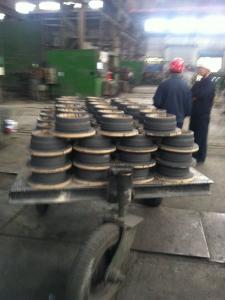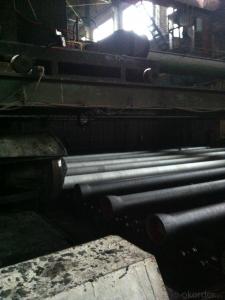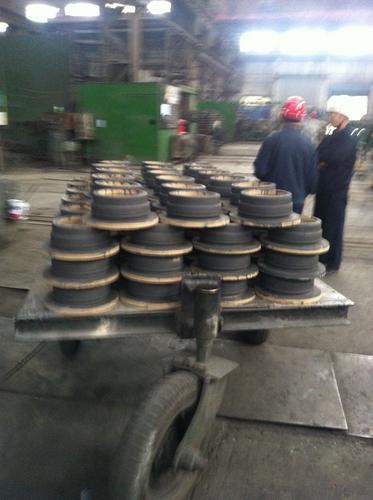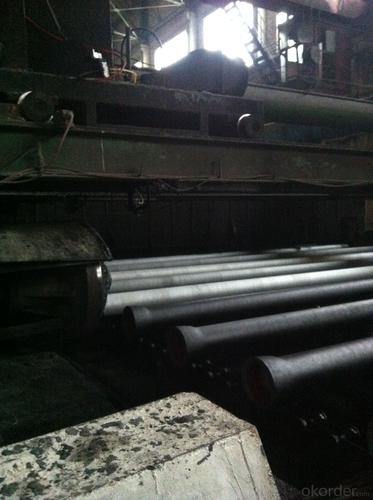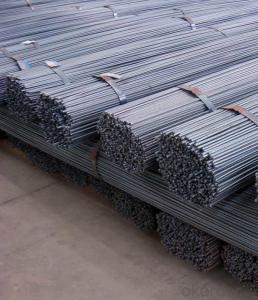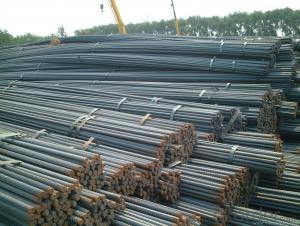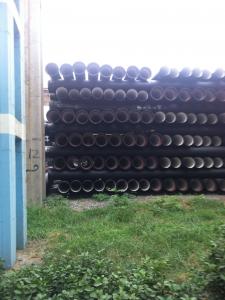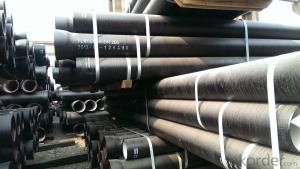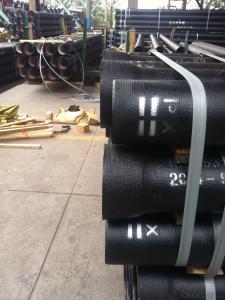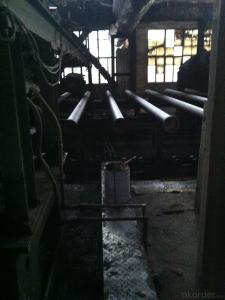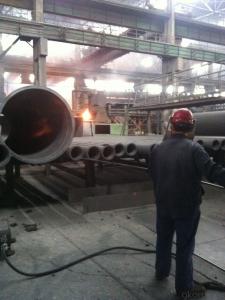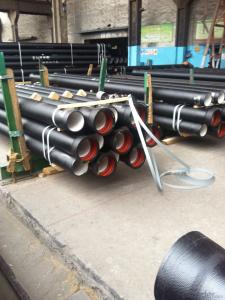DUCTILE IRON PIPES AND PIPE FITTINGS K7 CLASS DN450
- Loading Port:
- Tianjin
- Payment Terms:
- TT OR LC
- Min Order Qty:
- 22 pc
- Supply Capability:
- 3000 pc/month
OKorder Service Pledge
OKorder Financial Service
You Might Also Like
Material : Ductile Cast Iron
Size Range : DN 80mm to DN 2000mm
Unit Effective Length : 6m or 5.7m
Manufacture Standard: ISO 2531:1998/ EN 545:2006/EN 598:2007
Annual capacity : 200,000 tons
Coating Exterior: Zinc 130g/m2 according to ISO 8179-1 and bitumen coating 70 microns.
Cement Interior: Portland Cement/ High Alumina Cement/ Sulphate Resisting Cement Lining according to ISO 4179
Special requirements on external coating and internal lining can be applied
We also provide accessories such as SBR/EPDM rubber gaskets, lubricant paste, pipe caps, PE sleeves, etc.
Additional Parts:
Each pipe is strictly inspected according to related standard to ensure permanently high performance.
Easy Installation at site and service free for life
Long Service Lifespan
Quotation will arrive you within 24hours once we get your inquiry.
We guarantee offering you a competitive price.
A copy of original inspection reports of pipes will be offered after shipment.
Photos of loading process will be sent to the customer after shipment effect.
We will follow-up the delivery progress after shipment effect and update to the customer on weekly basis.
- Q: Are ductile iron pipes prone to external corrosion?
- External corrosion is not typically a concern for ductile iron pipes. This is because the material itself has protective properties. Ductile iron pipes are composed of a durable and strong material with a significant amount of graphite. The graphite serves as a natural barrier against external corrosion, effectively preventing rust and oxidation. Furthermore, ductile iron pipes are often coated with a layer of protection, such as cement mortar or polyethylene, to further enhance their resistance to corrosion. These coatings provide an additional safeguard, preventing contact between the pipe and any corrosive substances in the environment. It is important to note, however, that localized corrosion may still occur under certain conditions. Factors such as soil composition, moisture levels, and the presence of specific chemicals can potentially lead to the corrosion of ductile iron pipes in specific areas. Therefore, regular inspections and proper maintenance are necessary to promptly identify and address any potential corrosion concerns. In conclusion, ductile iron pipes are generally highly resistant to external corrosion. Nonetheless, like any other material, they require appropriate care and maintenance to ensure their long-term durability and reliability.
- Q: Can ductile iron pipes be used for water distribution networks in rural areas?
- Yes, ductile iron pipes can be used for water distribution networks in rural areas. Ductile iron pipes have excellent strength and durability, making them suitable for various applications, including water distribution. They can withstand high pressure, provide a long service life, and have good resistance to corrosion and external stresses. Additionally, ductile iron pipes are relatively cost-effective and require minimal maintenance, making them a reliable choice for water distribution networks in rural areas.
- Q: Are ductile iron pipes resistant to chemicals or solvents?
- Ductile iron pipes possess a general resistance to a wide variety of chemicals and solvents. This resistance can be attributed to their composition, which consists of a high percentage of iron and carbon, as well as small amounts of other alloying elements like silicon, manganese, and magnesium. These alloying elements contribute to the overall strength and durability of the pipes, thereby making them highly resistant to corrosion and chemical attacks. However, it is important to acknowledge that the resistance of ductile iron pipes to chemicals and solvents may vary depending on the specific substance and its concentration. Certain aggressive chemicals or solvents, especially those with high levels of acidity or alkalinity, may gradually corrode or degrade the material of the pipes over time. In such instances, it is advisable to consult the pipe manufacturer or a professional engineer to ensure the compatibility of the pipes with the specific chemicals or solvents being used. Furthermore, the proper installation and maintenance practices are critical factors in preserving the chemical resistance of ductile iron pipes. Regular inspections, cleanings, and the application of protective coatings can assist in extending the lifespan and performance of the pipes when exposed to various chemicals or solvents.
- Q: Are ductile iron pipes suitable for acidic or alkaline environments?
- Ductile iron pipes are generally suitable for both acidic and alkaline environments, although their performance may vary depending on the specific conditions. Ductile iron is a type of cast iron that has been treated with a small amount of magnesium to enhance its strength and flexibility. This treatment allows ductile iron pipes to withstand a wide range of conditions, including those found in acidic or alkaline environments. In acidic environments, ductile iron pipes provide good resistance to corrosion. The iron in the pipes reacts with the acid to form a protective layer of iron oxide, which helps prevent further corrosion. However, it is important to note that the performance of ductile iron pipes in acidic environments can be influenced by factors such as the concentration of the acid and the temperature. In highly concentrated or extremely acidic conditions, alternative materials like stainless steel or corrosion-resistant alloys may be more suitable. Similarly, in alkaline environments, ductile iron pipes exhibit good resistance to corrosion. The alkaline conditions in these environments typically help to passivate the surface of the iron, forming a protective layer that prevents further corrosion. However, as in acidic environments, the specific conditions and concentrations of alkalis may impact the performance of ductile iron pipes. In cases of very high alkalinity or extreme temperatures, other materials like plastic or concrete pipes may be more appropriate. It is worth noting that although ductile iron pipes are generally suitable for both acidic and alkaline environments, regular maintenance and monitoring are crucial to ensure their long-term performance. Proper attention should be given to monitoring the pH levels and other chemical characteristics of the environment to identify any potential issues or required maintenance. Consulting with experts or engineers in the field can provide valuable insights and guidance in selecting the most appropriate materials for specific acidic or alkaline environments.
- Q: If the ductile iron pipe is broken, can we use rush repair?
- In this way, manpower, material resources and financial resources can be saved, time can be saved, and unnecessary troubles to the citizens' water supply can also be reduced.
- Q: Can ductile iron pipes be used in dam or reservoir projects?
- Yes, ductile iron pipes can be used in dam or reservoir projects. Ductile iron pipes are known for their strength, durability, and corrosion resistance, making them suitable for various applications, including water distribution and transmission systems. In dam or reservoir projects, where the pipes need to withstand high pressure and carry large volumes of water, ductile iron pipes are often preferred. They have excellent mechanical properties, including high tensile strength and impact resistance, which ensure their ability to handle the load and provide a reliable and long-lasting solution. Additionally, ductile iron pipes are also adaptable to various installation methods, including trenchless techniques, making them a versatile choice for dam or reservoir projects.
- Q: What are the interface forms of ductile iron pipes? The best drawings are available. Thank you
- T interface type sealing ring is a self sealing rubber ring, when the pipe internal pressure increases, the contact pressure between the seal and the pipe increases, T interface can not only allow the deflection angle of the axial displacement, and convenient for installation. When the T type interface is installed, the sealing of the rubber ring can be ensured as long as the socket is simply loaded into the socket and the rubber ring is pressed tightly. This kind of interface has the advantages of reliable sealing, good seismic resistance and corrosion resistance, and it is a better interface.
- Q: How much is the installation cost of the ductile iron tube?
- From the hydraulic performance, because ductile pipe specifications generally refers to the inner diameter of PE pipe diameter specifications generally refers to the same specifications, because under the condition of ductile pipe can achieve greater runoff; from the installation and maintenance cost, ductile pipe have more favorable price. The inner wall of zinc spray, anti-corrosion materials such as cement mortar.
- Q: How much pressure can the ductile iron pipe socket meet?
- If you let him as the supporting points, I do not recommend this
- Q: What is the weight of a typical ductile iron pipe?
- The weight of a typical ductile iron pipe can vary depending on size and wall thickness. Ductile iron pipes are generally available in sizes ranging from 3 inches to 64 inches in diameter. The weight of these pipes can range from a few pounds per foot for smaller sizes to several hundred pounds per foot for larger diameters. Additionally, wall thickness plays a significant role in determining the weight of the pipe. Thicker walls will result in a heavier pipe. For example, a 10-inch ductile iron pipe with a wall thickness of 0.25 inches may weigh around 26 pounds per foot, while a 24-inch ductile iron pipe with a wall thickness of 0.5 inches can weigh approximately 175 pounds per foot. To determine the precise weight of a specific ductile iron pipe, it is essential to consult specific manufacturer specifications or engineering references.
Send your message to us
DUCTILE IRON PIPES AND PIPE FITTINGS K7 CLASS DN450
- Loading Port:
- Tianjin
- Payment Terms:
- TT OR LC
- Min Order Qty:
- 22 pc
- Supply Capability:
- 3000 pc/month
OKorder Service Pledge
OKorder Financial Service
Similar products
Hot products
Hot Searches
Related keywords
